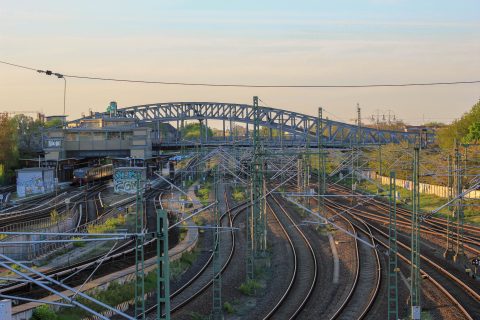
Should the EU compensate companies’ losses due to infrastructure works?
Railway networks throughout Europe are undergoing major infrastructural upgrades to ensure a more prominent role for rail. However, all these projects often cause disruptions, cancellations, or delays, and it is more difficult to find alternatives for freight than it is for passengers. How can rail freight companies be compensated for their losses and who should be the one paying? According to UIRR Chief Policy Advisor Akos Ersek, it is highly unlikely that the EU will take up the task since no budget was allocated for this purpose.
As Ersek explained, the European Union is not a federal government. Thus, it does not have the same financial freedom that governments of single states enjoy. “It is quite difficult to find resources for initiatives for which the EU has not allocated any budget”, he said. And this is the case for compensation of losses to rail freight companies due to infrastructure works. One possible solution would be for each Member State to request such compensation.
Spain seems to be the only country that has officially requested such compensation in its latest Recovery and Resilience Facility (RRF) application. They are asking the European Commission to allocate 8 million euros to reimburse companies for losses connected to infrastructure works for the period 2022-24. Various rail freight associations from all over the continent agree that it should be up to EU institutions to find effective solutions for all Member States.
Divided opinions
Italian rail freight association FerMerci, for example, pointed out that these types of compensation are vital and should come from the EC without countries having to ask. They underlined that, if companies are not compensated for their losses due to infrastructure upgrades, they might not survive. “Without a fund to support rail freight companies, there is a risk that the scope of the investments envisaged in the RRFs will be thwarted because there may be fewer operators at the end of the works than today”.
The Polish Association of Independent Railway Carriers (ZNPK) agrees that it should be up to the EC to take care of this problem. “If there is a dedicated stream of money that can be used only for compensating losses carried due to infrastructure works then it is much more probable that this kind of support will be deployed”, said ZNPK’s General Director Michał Litwin. On the other hand, he underlined, if this were to be left up to national governments, each one might allocate the money for different purposes.
Hans-Willem Vroon, Director of the Dutch rail freight association RailGood also agrees with FerMerci and ZNPK’s views. “It would be fair that rail transport carriers are compensated for the extra costs of detours and at least part of the loss of income that causes a lot of extra work o the rail infrastructure”, Vroon added. However, “this is not the responsibility of the Union. EU member states must finance these initiatives”, he said. Vroon stated that RailGood has been in talks concerning this type of reimbursement with the Dutch infrastructure manager ProRail for a couple of years already. “We will have another meeting in mid-September”, he concluded.
Also read:



